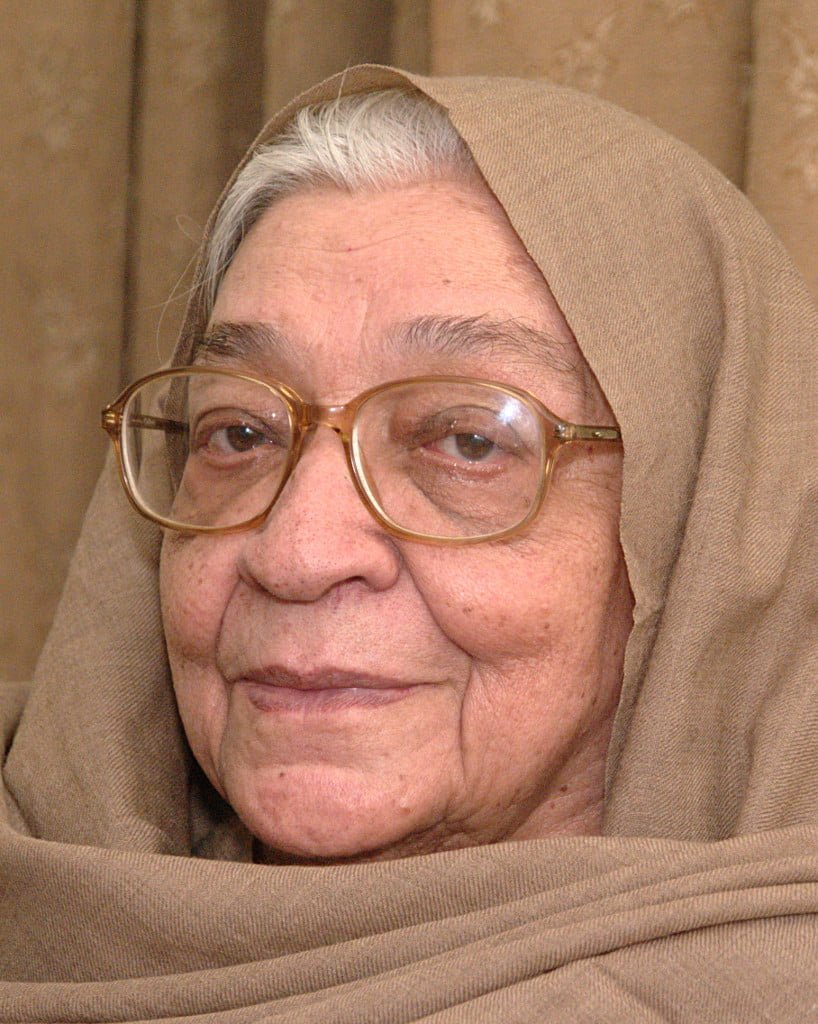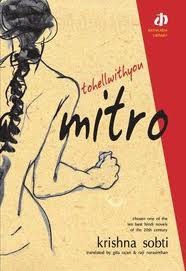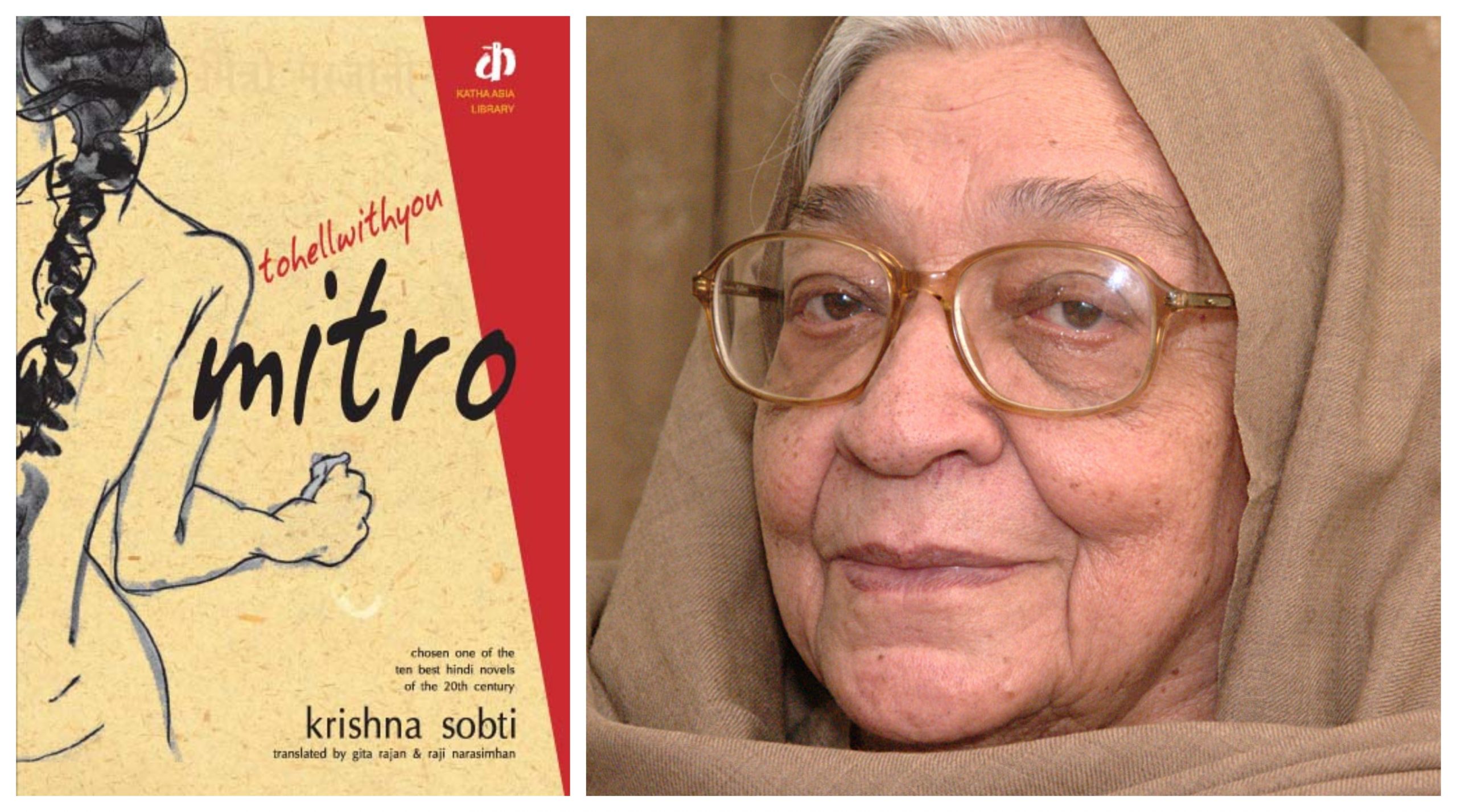All of Krishna Sobti’s writings reflects on different kinds of women in different situations. Each of her female protagonists show a side to Indian womanhood that is either neglected or overlooked. Mitro Marjani or To Hell With You Mitro is a prime example of this as Sobti’s protagonist is denied the innate human desire for sexual pleasure as it is seen as whore-like.

Book: To Hell With You Mitro (Hindi: Mitro Marjani)
Author: Krishna Sobti (translated by
Publisher: Katha, 2007
Genre: Fiction

Mitro Marjani or To Hell With You Mitro is about the middle daughter-in-law of the traditional Gurudas’ family, Sumitravanti (aka Mitro), who is unapologetic about her sexuality. In this story, Sobti presents three very different daughters-in-law. The first is the ideal submissive daughter-in-law, the second a rebel, and the third is disinterested in being part of the family. The novel follows Mitro, on her quest to fulfilling her sexual desires which is not fulfilled by her husband. Mitro is unconventional as she speaks about things a woman from a respectable Indian family would not candidly speak about, like sex. Although at the start, while Mitro is seen in a villainous light by the other family members, readers are also presented with a side to her which is warm and caring.
Mitro Marjani is about the middle daughter-in-law of the traditional Gurudas’ family, Sumitravanti (aka Mitro), who is unapologetic about her sexuality. In this story, Sobti presents three very different daughters-in-law. The first is the ideal submissive daughter-in-law, the second a rebel, and the third is disinterested in being part of the family.
Mitro Marjani is often been referred to as a radical novel, as renowned for its feisty protagonist as for its vibrant, vital and electric language, but has also been criticised by feminists for its conventional ending. To spear-head the feminism implicit in Mitro Marjani – i.e., to glorify, celebrate and hail Mitro as a hero of a repressive society – is to, logically speaking, not only cuts through the repressive patriarchal family structure of the Indian family system but also upturns it. A character like Mitro can flourish, and be free in only a society which makes no distinction whatsoever on the basis of gender – a conception that goes beyond the conventional fight against patriarchy, into the realm wherein gender as a construction does not exist. For this, To Hell With You Mitro is ahead of its times.
The Plot And Mitro
Mitro’s husband, Sardarilal, severely reprimands her of looking at him unflinchingly but ‘Mitro stood her ground facing him, big brown eyes unblinking’. Despite her mother-in-law’s request to stand down, Mitro does not listen to, or lower or cover her head in respect, even when other male members of the family are present, which infuriates them as well. Mitro is punished for her ‘wanton ways’ and is insulted as being a ‘shameless hussy’, and ‘whore of whores!’, just because she revels in her sexuality, and demands its satisfaction from her husband.
Mitro was raised by a single mother, who was a famous courtesan, which her conventional in-laws somehow overlooked before choosing Mitro for their son. She has been exposed to the hypocrisies of society towards women’s sexuality from childhood. It is an acknowledged fact, by many male writers themselves, that a prostitute is both the most objectified, and the freest woman in an orthodox society such as this one. Balo too is one such woman, ‘masculine’ in her intensity and passion for a man, and in her pursuit of them, along with a ‘hard-headed’ entrepreneurial mind. But such a direct approach, devoid of any outward layers of feminine subversion and passivity, is severely punishable in a traditional family like that of Mitro’s. Traditionally, according to patriarchal standards, a woman must both be constantly available (to fulfill a man’s need), and yet be the most invisible member – or, a meek slave to the man.
Mitro’s obstinate nature, her demand for the fulfilment of her wishes, and her blatant complaint of her husband’s lack of virility, aggravates the family members (especially her husband) because such behaviour is not only associated with whores, but it also deeply disturbs their sense of control over a woman’s body. Additionally, her lack of shame in her dressing sense attracts flirtatious taunts from the men of the streets, to which she only responds by an equally witty reply, equalising and controlling the situation.
Mitro’s obstinate nature, her demand for the fulfilment of her wishes, and her blatant complaint of her husband’s lack of virility, aggravates the family members (especially her husband) because such behaviour is not only associated with whores, but it also deeply disturbs their sense of control over a woman’s body.
But, even this is a dire transgression. Suspecting her of having affairs, a family meet is called, wherein she is interrogated. To which she replies an ambiguous ‘yes and no’. Assuming her of evading the situation, Dhanvanti wails in horror, ‘This is ghor kalyug, the age of darkness! When eyes are drained of shame and remorse, what is family honour, what propriety and what social standing?’ But Mitro is refreshingly un-hypocritical when she grounds her statement by saying that though she is not conducting an illicit affair, she is also not denying that fact that she does have desires that are unfulfilled.
She adds later in To Hell With You Mitro, that if a man had had such a complaint, he would have been understood and sympathised with, and his philandering would have also been legitimised. This is because, unlike a woman’s sexuality, his conducts do not have a bearing on the family’s standing. But a woman, like Mitro, with the same behaviour, is punished ‘with kicks and blows and abuses and accusations day in day out.’
Women’s Sexuality
That a woman’s sexuality is the centre of feminist discourse is because of such commonplace, every-day and seemingly inevitable situations – and Mitro’s attempt to subvert it is thus fundamentally radical. Feminist discourse asserts that it is the moulding and direction of sexuality which organizes men and women into two sexes – which sums up all the societal relations of which heterosexuality and family are its structures.
‘Feminism is a theory of power and its distribution – based on female sexuality…Therefore, feminism ultimately recognizes sexuality as the primary social sphere of male power – and linked to this are issues such as abortion, domestic violence, rape, incest, lesbianism, sexual harassment, prostitution, sexual slavery etc. Thus feminism emerges as a political theory centring upon sexuality: its social determination, daily construction, birth to death expression, and ultimately male control.’
In this system, a woman’s sexuality and biology is said to be the determinant of her being merely a reproductive vessel and sex-slave to men – and this in turn leads to gender constructions. Simone de Beauvoir, Judith Butler, and many feminist theorists have deconstructed this myth of sex and gender being interrelated and ‘natural’ truths; they are only but a construct meant to serve patriarchal interests. ‘One is not born, but rather, becomes a woman’, Beauvoir said, an idea Butler furthered with her theory of gender performativity, wherein women are made to be passive, docile, sacrificing, obedient, domestic and nurturing, or loving sexed-body slaves to men.
Thus, in patriarchy, a women’s sexuality does not belong to herself, nor is it constructed and directed by her – it belongs to the male members of the system – first to her patriarchal head of the family, then to her husband, or a means of pleasure to other men. But it is not hers to direct, flaunt, or control. In the case when a women begins to control her own sexuality upon which all forms of power relations play out, the hierarchy of the system is subverted.
Thus, Sobti in To Hell With You Mitro exposes that ‘patriarchy in the garb of “culture” tends to contain the so-called “natural”, “biological”, “overflowing”, “turbulent” female sexuality for etching out class, caste, and communal boundaries.’ Mitro is subversive primarily because, through her defiant language riddled with sexual innuendos, and her celebration of her sexuality and body, and in spite of repression in the form of insults and beatings, she manages to control her sexuality and its direction.
Also read: Krishna Sobti: Doyen Of Hindi Literature | #IndianWomenInHistory
‘She refuses to channelize her bodily desires into patriarchal value … and refuses to turn herself into an ideal abstraction, a virtual shadow of patriarchal will.’ She rejects the label of a whore (as technically, she is not unfaithful), but also that of the submissive wife devoid of desires. Thus, she opens up a third space wherein desire, freedom of sexuality, love, and respect and acceptance, can co-exist – a space that is granted only to men. However, Mitro does not challenge the structure of the family at any juncture – she only wants to add this space into the family system. In this sense, Sobti is realistic in her understanding of a character like Mitro, and of her aim regarding her novel.
To keep tongues from wagging and destroying the family’s standing in the community, Mitro is sent back to her mother, Balo. Balo’s haveli, wherein in her youth she entertained her lovers, but in her old age lives alone, functions as an ambiguous space. Here, Mitro is granted a choice to fulfill her desires. Balo, understanding of her needs, grants her a night with her gardener, whom she has already ‘used’.
The choice of words the women use to describe him is interesting, as it is a reversal of men objectifying women’s bodies. Thus, approaching the gardener as merely a sexed body to fulfill her needs, is a radical subversion. By fulfilling her needs, minus the guilt, she is an active agent, controlling, and directing her sexuality, and hence dismantling the various structures of power and control that have been written and enforced onto her body as a woman.
By fulfilling her needs, minus the guilt, she is an active agent, controlling, and directing her sexuality, and hence dismantling the various structures of power and control that have been written and enforced onto her body as a woman.
Secondly, it underlines the fact that gender is but a construction, as women too can behave like ‘men’. Mitro and Balo are not meek, passive women, but ‘masculine’, since they are strong-headed, and active agents of their own life and sexuality – they do not submit – and such is their natural form, independent of their gender or sex. This shows that gender is performative . Living without a male authoritative figure asserting his authority over them, both grew up to be true to themselves.
Thus, there is no ‘masculine’ or ‘feminine’ at all, but just character traits. By viewing society through this lens, the construction of two basic types of gender, based on heterosexual desire, is concluded as false, as there is no ‘he’ or ‘she’, but just ‘it’. Thus, this free space, the most subversive of them all, completely upturns the normative societal functions – but in such an instinctive manner that it is almost imperceptible.
Conclusion
But, Sobti in To Hell With You Mitro does a reversal that is a disappointing conclusion to a radically feminist text. Balo as a mother is not a traditional mother, like Mitro’s mother-in-law Dhanvanti and Suhag, her sister-in-law. Dhanvanti and Suhag have internalised their patriarchal roles so deeply that they have allowed their status as a mother define their complete identity and existence. Patriarchy also rewards such behaviour. Sobti shows that it is such women who enforce patriarchal standards on other women most fiercely.
Suhag, especially, is a typically submissive, ‘mild-mannered’ and subsuming wife and daughter-in-law, who feeds on the appreciation she receives for taking care of everyone’s needs. Yet, or because of her position and internalisation, it is she who is most severely reprimands Mitro for her outrageous behaviour (after her husband). Likewise, Dhanvanti too feeds off her identity as a nurturing mother and wife. Balo, however, does not let motherhood define her existence, or her identity, or her behaviour towards her daughter. She regards Mitro as a close woman friend.
Which is why, Balo, in her lonely aged condition, experiences sudden and powerful pangs of jealousy as her daughter, in her ripe youth, heads towards her tryst with the gardener – and does so without any guilt. However, seeing Balo in such a desolate state, and frightened because of it, Mitro rejects her and this radical space (which, metaphorically depicted as the empty house of Balo, is empty, ghost-like and hollow) and runs back to her husband. What could have been the culmination of a radical undertaking is but destroyed.
However, it is also plausible to see Mitro’s reaction as an instinctive, natural reaction to an unexpected, shocking and overwhelming situation. Sobti in To Hell With You Mitro defends it as such too –‘…that was not the author’s inability to cope with the situation. It was the logic of an inner conflict and its consequences. Mitro finds her mother a shattered woman, a shadow who has nowhere to go, so she turns back to the husband and a home. A simple logic of option.’
Also read: Lust Stories: The Space Between Silence, Uncertainty And Conversations
Ultimately, Mitro Marjani or To Hell With You Mitro was ahead of its times, and radically subversive in real, and not abstract, terms, keeping in mind Mitro’s ultimate position as a dependent woman. Sobti’s novel shows the existence of desire within women as a potent human reality. Mitro’s character is used to create space for women’s sexual desires within the traditional family system of India. This is still relevant today as can be seen in the third story in the Lust Stories Anthology where Megha’s mother-in-law states that women have no desire beyond their husband and children.
About the author(s)
Nikhat is a Civil Servant and Communications Manager for BBPC Poetry Collective. Her academic research interests include wartime gender-based violence and intersectional feminist historiography.







Good content